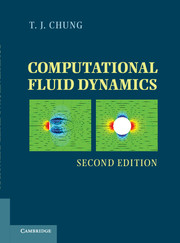Book contents
- Frontmatter
- Contents
- Preface to the First Edition
- Preface to the Revised Second Edition
- Part One Preliminaries
- Part Two Finite Difference Methods
- Part Three Finite Element Methods
- Chapter Eight Introduction to Finite Element Methods
- Chapter Nine Finite Element Interpolation Functions
- Chapter Ten Linear Problems
- Chapter Eleven Nonlinear Problems/Convection-Dominated Flows
- Chapter Twelve Incompressible Viscous Flows via Finite Element Methods
- Chapter Thirteen Compressible Flows via Finite Element Methods
- Chapter Fourteen Miscellaneous Weighted Residual Methods
- Chapter Fifteen Finite Volume Methods via Finite Element Methods
- Chapter Sixteen Relationships Between Finite Differences and Finite Elements and Other Methods
- Part Four Automatic Grid Generation, Adaptive Methods, and Computing Techniques
- Part Five Applications
- Appendixes
- Index
- References
Chapter Thirteen - Compressible Flows via Finite Element Methods
from Part Three - Finite Element Methods
Published online by Cambridge University Press: 05 June 2012
- Frontmatter
- Contents
- Preface to the First Edition
- Preface to the Revised Second Edition
- Part One Preliminaries
- Part Two Finite Difference Methods
- Part Three Finite Element Methods
- Chapter Eight Introduction to Finite Element Methods
- Chapter Nine Finite Element Interpolation Functions
- Chapter Ten Linear Problems
- Chapter Eleven Nonlinear Problems/Convection-Dominated Flows
- Chapter Twelve Incompressible Viscous Flows via Finite Element Methods
- Chapter Thirteen Compressible Flows via Finite Element Methods
- Chapter Fourteen Miscellaneous Weighted Residual Methods
- Chapter Fifteen Finite Volume Methods via Finite Element Methods
- Chapter Sixteen Relationships Between Finite Differences and Finite Elements and Other Methods
- Part Four Automatic Grid Generation, Adaptive Methods, and Computing Techniques
- Part Five Applications
- Appendixes
- Index
- References
Summary
In this chapter, finite element analyses of both inviscid and viscous compressible flows are examined. Traditionally, computational schemes for compressible inviscid flow are developed separately from compressible viscous flows, governed by Euler equations and Navier-Stokes system of equations, respectively. However, it is our desire in this chapter to study numerical schemes capable of treating a compressible flow with or without the effect of viscosity or diffusion. Furthermore, it would be desirable to develop a scheme that can handle all speed regimes – not only the compressible flow, but the incompressible flow as well. To accomplish this goal, the most suitable governing equations to use are the Navier-Stokes system of equations written in conservation form in terms of conservation variables. Advantages of transforming the conservation variables into entropy variables and primitive variables will be explored. One of the most prominent features in compressible flow calculations is the ability of numerical schemes to resolve shock waves or discontinuities in high-speed flows. Furthermore, compressible viscous flows at high Mach numbers and high Reynolds numbers lead to significant numerical difficulties. We shall address these and other issues in this chapter.
To this end, we begin with the general description of the governing equations in Section 13.1, followed by the Taylor-Galerkin methods (TGM), generalized Galerkin methods (GGM), generalized Petrov-Galerkin (GPG) methods, characteristic Galerkin methods (CGM), and discontinuous Galerkin methods (DGM) in Sections 13.2 through 13.4. Finally, the flowfield-dependent variation (FDV) methods introduced in FDM and discussed earlier in Section 6.5 will be presented for FEM applications (Section 13.6). This subject will be treated again in Chapter 16, where many of the methods in both FDM and FEM can be shown to be the special cases of FDV methods.
Information
- Type
- Chapter
- Information
- Computational Fluid Dynamics , pp. 426 - 471Publisher: Cambridge University PressPrint publication year: 2010
